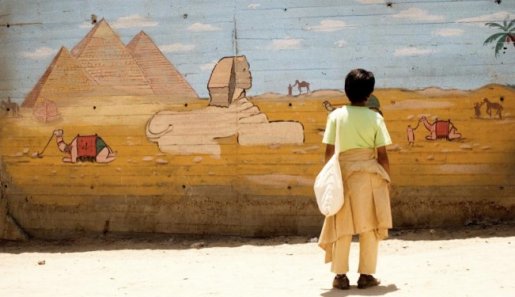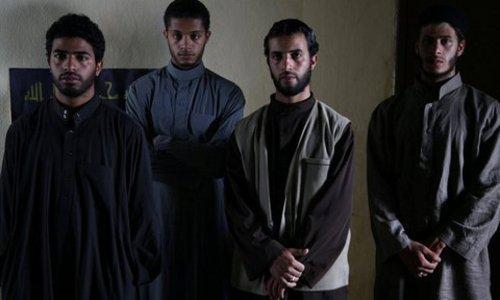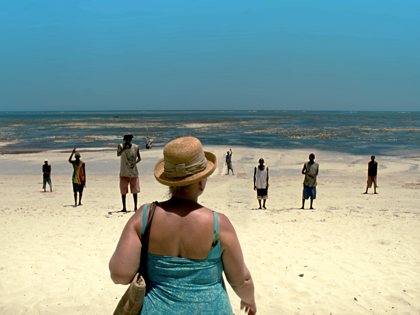Cannes 2012: Four Films from Africa


Séamas McSwiney is our guest film correspondent with decades of experience in film journalism, and work published in some top international publications. He is reporting from Cannes 2012, and today looks at four films from what is ofter an forgotten continent.
"It's a Cannes constant to comment on the absence of films from the African continent. Perhaps quality cinema production could even be considered a rough benchmark for economic development. This year there were films a plenty from South America and the Asian presence is now a constant both in terms of film production and audiences. China will be the new goldmine for revenue generated by the silver screen and by its digital offspring.
Still, there were four films flying in from four separate corners of the biggest continent: two from North Africa, Egypt and Morocco, dealing respectively with The Arab Spring and jihadi suicide bombers; and two from sub-Sahara, East and West, telling stories that again confront the dangers and indignities that deprivation will drive people to.
After the Battle (dir. Yousry Nasrallah)
In Competition was After the Battle, by Yousry Nasrallah (pictured above), an Egyptian film that tackles the aftermath of the battle where camels and horses were ridden into the demonstrations in Tahrir Square on February 2nd 2011. They did so to violently intimidate the protesters. It tells the story of an unlikely relationship between a middle class advertising executive and one of the offending horsemen. She is also a democracy advocate investigating the events from a human rights perspective and he is now humiliated and unemployed in his village adjoining the pyramids. Their lives, and families  and colleagues intermingle and, though the film doesn't hit any cinematic high notes, the story reveals just a few more layers of the deep complexity of the Egyptian chapter of the Arab Spring.
and colleagues intermingle and, though the film doesn't hit any cinematic high notes, the story reveals just a few more layers of the deep complexity of the Egyptian chapter of the Arab Spring.
Horses of God (dir. Nabil Ayouch)
Horses of God, by Nabil Ayouch (right), was presented in the parallel Un Certain Regard section. The title has the tag line "No one is born a martyr..." and it effectively tells the story of four young boys who grow up in a shanty town on the outskirts of Casablanca. They never even think of venturing into the city, such is the penury of their existence. This fictional story is based on four synchronised suicide bombings that took place in Casablanca in 2003, when 14 young men from the Sidi Moumen quarter killed dozens. What is most revealing in Horses of God is the separate motivations and personalities of the bombers and the differences in perspectives and opinion of the population.
Paradise: Love (dir. Ulrich Seidl)
 Paradise: Love (left) is one part of a trilogy by controversial Austrian auteur Ulrich Seidl. The other two parts will be called Paradise: Faith and Paradise: Hope. Ulrich Seidl has an established reputation for his harsh and un-Charitable take on the human condition. Here we follow Teresa, an overweight middle-aged Austrian woman who travels on a package holiday to a splendid Shanzu Beach holiday resort, near Mombasa in Kenya. With the encouragement of her fellow mature female tourists she seeks love in the arms of local beach boys.
Paradise: Love (left) is one part of a trilogy by controversial Austrian auteur Ulrich Seidl. The other two parts will be called Paradise: Faith and Paradise: Hope. Ulrich Seidl has an established reputation for his harsh and un-Charitable take on the human condition. Here we follow Teresa, an overweight middle-aged Austrian woman who travels on a package holiday to a splendid Shanzu Beach holiday resort, near Mombasa in Kenya. With the encouragement of her fellow mature female tourists she seeks love in the arms of local beach boys.
From episode to episode, her experiences become more and more grotesque and pitiful, as Seidl strips away cultural curiosity and human warmth to reveal how an absence of love is sure path to indignity...for everyone. Despite everything, he does make some interesting, if extreme, points. However, I'm sure the Kenyan Tourist Board feel little love for him and will not be keen that he return to make his versions of Hope and Faith.
The Pirogue (dir. Moussa Touré)
A pirogue is a large seafaring, flat-bottomed, fishing boat, commonly found in West Africa. The Pirogue is a Senegalese film by Moussa Touré that tells the tale of one the very many boats like this that are also used to smuggle Africans to Europe on these boats on the long journey to Spain in a desperate attempt to find a better life. Many don't make it and thousands have died trying in the past few years. The Pirogue tells of a particularly fraught journey, complete with impressively filmed storm sequences and a complex set of characters and relationships among the thirty, diverse, would-be exiles that set out on the dangerous journey to a better life."
You can read more posts by Séamas here.








